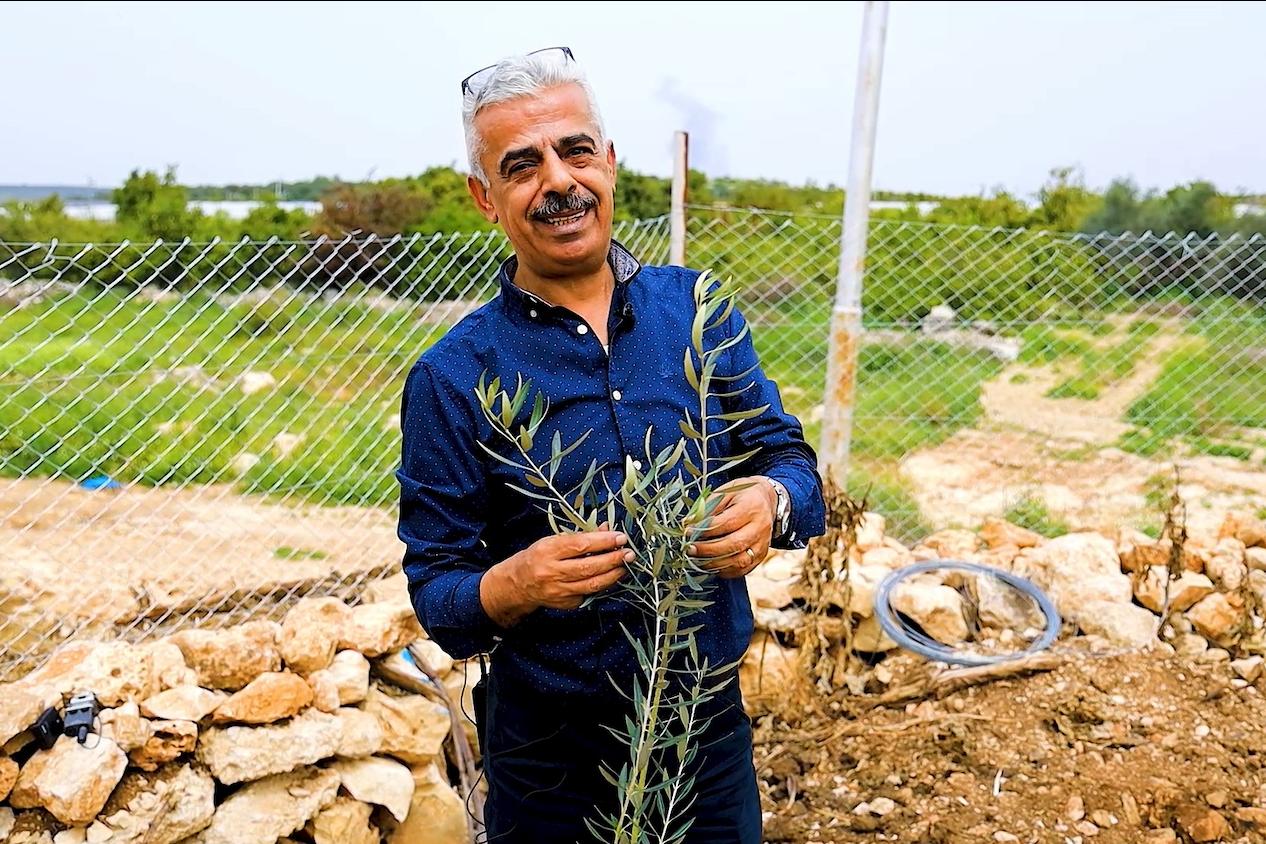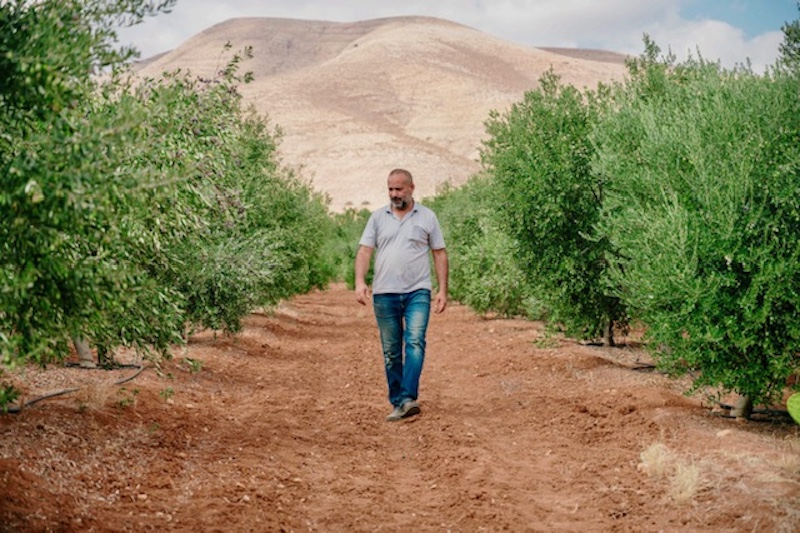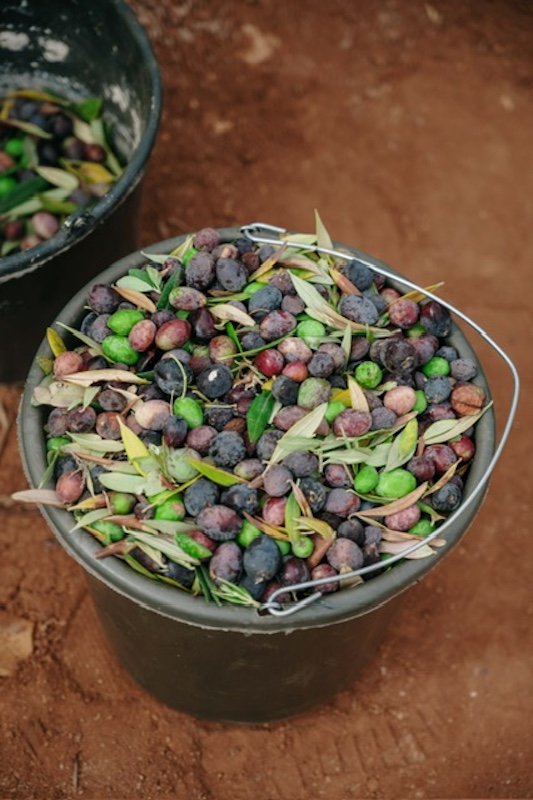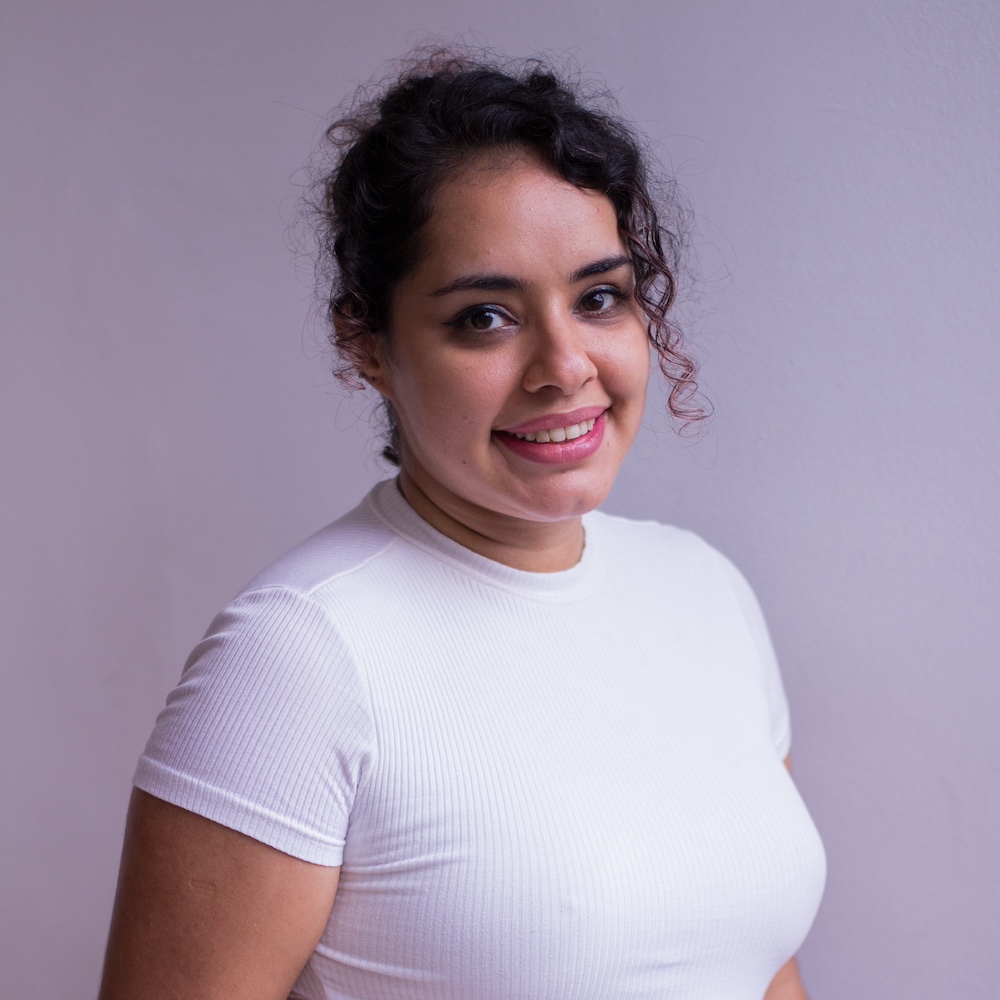
Abbas Milhem, executive director of the Palestinian Farmers’ Union, with an olive tree sapling. (Image courtesy of Treedom for Palestine.)
Palestinian farmers in the West Bank are faced with two challenges: the impacts of climate change and the daily struggle of Israel’s occupation. In response to these obstacles, the Palestinian Farmers’ Union and the nonprofit Treedom for Palestine are expanding their efforts to plant olive tree farms across the territory — with a goal of reaching 1,000.
The program has created over 70 farms since it started in 2018. Each one, called a Freedom Farm, hosts 250 trees. They’re a species native to Palestine that are drought- and fire-resistant with low water requirements. Most importantly, they give economic stability to Palestinian farmers and their families at a time when they need it the most.
The project also preserves Palestinian heritage. “It's a way of connecting people with the land here in Palestine,” Abbas Milhem, executive director of the farmers’ union, told TriplePundit. “The olive tree is a very special and unique tree in Palestine. It's not just a tree. It is something that symbolizes culture, heritage, identity, peace, love, history, existence. When Palestinian farmers would express their love, they compare it with the olive tree. If they want to spend joyful time, they go under an olive tree. It is historic, it has been cultivated in Palestine for generations.”
Fallow land is the easiest for Israel to claim for settlements and military outposts, Milhem said. The planting of olive tree farms helps Palestinian farmers safeguard their land.
“The more you cultivate the land, the more you make that risk of confiscation lower and lower,” he said. “Because empty land in Palestine is an easy target for annexation, settlement expansion or confiscation. Now, we have different options when we cultivate the land.”

The longevity of olive trees — around 500 years — also ensures that future generations of farmers would be connected not only to the land, but also to the ancestors who first planted the trees, Milhem said.
“When you plant an olive tree, you know that olive tree will continue surviving for the coming 500 years,” Milhem said. “So your sons and your granddaughters and the others who will come after, they will stay connected with that tree and [to] your heart, the one who planted that tree. So, when they harvest, they harvest something that belongs to older generations, and it becomes a culture.”
Olive trees are something to behold when it comes to climate resilience, too. Each Freedom Farm is projected to capture 18,000 pounds of carbon dioxide annually, potentially offsetting 9 million pounds over the trees’ 500-year lifespan. Their low need for water irrigation also addresses the water scarcity of climate change and the withholding of water by Israel.
While these circumstances are unique to the West Bank, where climate change and occupation converge to make farming difficult for Palestinians, they have motivated farmers to develop climate-resilient methodologies that are scalable to any other territory experiencing similar struggles.
“In Palestine, if you compare the average rainfall we get yearly now, it's almost half the rainfall we used to get 35 years ago,” Milhem said. “And because we are under occupation, our farmers lack access to their water natural resources that are under the control of the Israeli. We try to adapt with what we call, ‘water use efficiency,’ [using] a smaller amount of water that is the minimum of what is needed to irrigate a tree.”
Palestinian farmers are also returning to traditional farming practices and moving away from using chemicals that have destroyed the soil. And planting domestic olive tree seeds boosts climate resiliency by returning native vegetation to the land, Milhem said. The hope is that these practices will spread as the project grows and shows results.

“If you can imagine expanding this philosophy and culture among many farmers in the region and across the globe, we can really help our mother nature heal itself from all the wrongs human beings who don't care about the environment are doing,” Milhem said. “We are proud of being the ones holding the torch through cultivating olive trees. An olive tree will last for 500 years, and day by day, 24 hours a day, seven days a week, 365 days a year, this tree will continue cleaning up the air and the climate.”
The solution must come from people who love and cultivate the land — and Palestinian farmers are proud and eager to take on that role, Milhem said. The farmers’ union wants farmers to be invited to participate in climate change conferences and policy-making and be given support when creating and testing climate resilient practices.
“Those who created the problem and destroyed nature, the environment, and the climate cannot be the solvers,” Milhem said. “Those who can solve the problem are farmers. And farmers are the cornerstone of any intervention that would bring life back to nature. If we believe in this, then interventions and support need to be given to farmers in this regard.”

Nicole Froio is a writer and researcher currently based in Rio de Janeiro in Brazil. She has a doctorate in Women's Studies from the University of York. She writes about gender in pop culture, social movements, digital cultures and many other topics.














